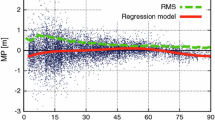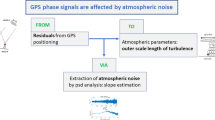Summary
GPS phase measurements can be processed by using a number of different algorithms. These include models based on (interferometric) single differences, double differences and triple differences, as well as an algorithm using the direct observable, i.e. the pure phase measurement. Theoretically, subject to including appropriate a priori covariance matrices, which express the geometrical configuration (correlation) between the different nominal observables, the results should be identical. Conversely, neglecting these covariances could lead to different numerical answers. Identical GPS data sets are processed with software packages based on different algorithms, and the resulting discrepancies established, in order to asses whether or not they are significant. Similarly, differential ionospheric and tropospheric corrections are evaluated and their significance determined for baselines of different lengths.
Similar content being viewed by others
References
V. ASHKENAZI, L.G. AGROTIS and J. YAU (1985): “GPS Interferometric Phase Algorithms”. Proc. First Int. Symp. on Precise Positioning with the Global Positioning System, Rockville, Maryland.
C.C. GOAD (1985). “Precise Relative Position Determination Using Global Positioning System Carrier Phase Measurements in a Nondifference Mode”. Proc. First Inst Symp. on Precise Positioning with the Global Positioning System, Rockville, Maryland.
A. KLEUSBERG, R.B. LANGLEY, R. SANTERRE, P. VANICEK, D.E. WELLS, G. BEUTLER (1985): “Comparison of Survey Results from Different Types of GPS Receivers”. Proc. First Int. Symp. on Precise Positioning with the Global Positioning System, Rockville, Maryland.
B.W. REMONDI (1984): “Using the Global Positioning System (GPS) Phase Observable for Relative Geodesy: Modelling, Processing and Results”. PhD Dissertation, University of Texas at Austin, Texas.
Author information
Authors and Affiliations
Rights and permissions
About this article
Cite this article
Ashkenazi, V., Yau, J. Significance of discrepancies in the processing of GPS data with different algorithms. Bull. Geodesique 60, 229–239 (1986). https://doi.org/10.1007/BF02521054
Received:
Accepted:
Issue Date:
DOI: https://doi.org/10.1007/BF02521054




